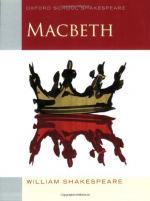|
This section contains 1,457 words (approx. 5 pages at 300 words per page) |

|
Macbeth: "what is fair is foul, and what is foul is fair"
Summary: Essay discusses the motif "what is fair is foul, and what is foul is fair" in William Shakespeare's "Macbeth."
Throughout William Shakespeare's famous tragedy, Macbeth, many motifs can be traced. The motif "what is fair is foul, and what is foul is fair" is well established through out the entire play. It reaches into every aspect of the play. Specifically, it is evident in the plot, setting, and characters. The presence of the motif often causes the reader and characters to expect things that are in truth, the opposite of what will actually happen. In many instances, the characters themselves often appear to be something that they are not. It is through this motif that readers learn of the horrendous consequences Macbeth must cope with as a result of his sin.
In act one, scene one, three witches, the Weird Sisters, are introduced. During this short, yet important scene, Shakespeare establishes a brooding sense of doom. The witches play an important role with their predictions. These predictions...
|
This section contains 1,457 words (approx. 5 pages at 300 words per page) |

|


